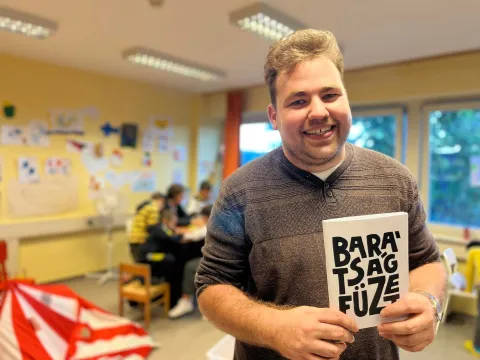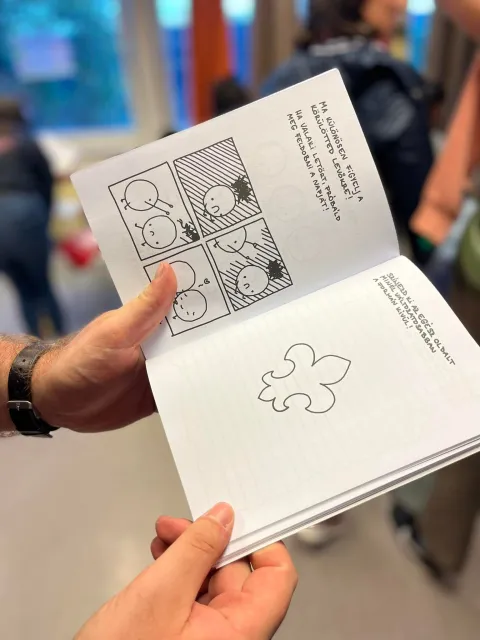Applying my strengths to give refugee children a sense of community

Marci Hajdu, 26-years old, is a Scout leader in Hungary, who was among the first responders at a railway station, assisting newly arrived refugee families from Ukraine. Marci holds a degree in psychology and has been actively involved in the UAct project. Building on his experience and knowledge in both psychology and Scouting, Marci created the “Friendship Book”, a child-friendly activity book that the National Scout Organization (NSO) in Hungary has published and distributed to over 100 Ukrainian young people for the booklet’s reflective and peacebuilding nature. This story is narrated by Marci.
It was an emotional time for all of us volunteering at the railway station. I was there with my Scout friends. Many women and children were arriving, carrying little belongings and unsure of what is next for them. They were leaving their whole life behind just to be somewhere safe. We helped them with things they urgently needed and gave them important information. Honestly, it was heartbreaking but at the same time humbling and uplifting to see such kindness and humanity around us, because everyone there was genuinely helping.
I later became involved in the UAct project, where I was trained on psychological first aid, communication and working with children affected by conflict. Each week I visited a day care centre that the Hungary NSO set up for Ukrainian children, and Zubeta refugee shelter in Budapest, where around 90 Ukrainians are living.
There are several families sharing a room in this shelter and the children speak mostly Hungarian as they are from Ukraine’s Transcarpathian region, on the borders with Hungary. The war forced them to move into Hungary and find shelter and protection here. During my time at the day care, as well as at the shelter, I was noticing the sense of community that these activities were giving the refugees. This reassured the parents because they could leave their children in this safe environment while they are busy with job search and registration matters.
At the shelter, myself and another Scout play games with the children, we lead arts and crafts activities, build with Legos, sing together and sometimes play an animation movie for the children. When I began to understand their needs, I wanted them to have a tool that helps their knowledge and overall wellbeing.
As a Scout, I believe it’s important to help my community and in front of me were children who needed help integrating into a new life that they didn’t quite understand. Children need special attention during crisis, because they are also experiencing grief.
I created the Friendship Book. It is full of short activities and tasks for children that teach them emotional intelligence, finding creative solutions, Scouting values, how to be a good friend and a lot more. I created two versions of the book that are suitable to different age groups, so it can help all refugee children. I worked with my NSO to finish the book and translate it into Ukrainian before we distributed it to children.

My proudest moment was seeing the Friendship Book printed and watching the children at the shelters excited as they flipped through the pages and immediately started coloring in it. I find it very rewarding that the children wait for us each week. I know we’re creating a special bond with them that helps them adapt and become more resilient.
This also motivates me to want to become a trainer and help other young people to do this work. I plan to progress in my psychology work and focus on child protection, because I think that’s very important to provide.
About the Scouts’ Diary for UAct: Scouts in Humanitarian Response for Ukraine
The World Organization of the Scout Movement European and Eurasia regions have partnered with UNICEF Europe and Central Asia to deliver relief aid and non-formal education to those affected by the war in Ukraine. This partnership covers Romania, Moldova, Hungary, Slovakia, Czech Republic, Poland, Lithuania, Latvia, and Ukraine. The Scouts’ Diary is a series of essays and interviews capturing the experiences of those involved in the project.